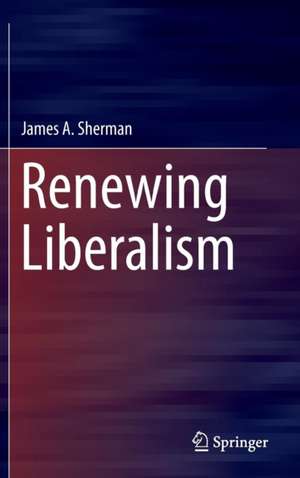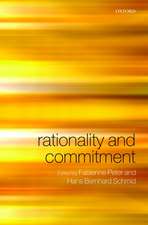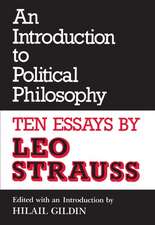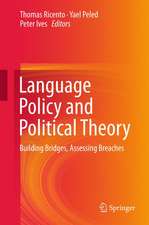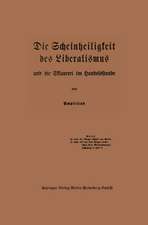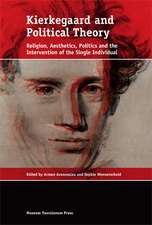Renewing Liberalism
Autor James A. Shermanen Limba Engleză Hardback – 26 apr 2016
The early chapters of the book challenge the traditionalconservative idea of individual liberty—the liberty to dispose of one’sproperty as one wishes—and replace it with a new one, according to which libertyis of equal value to all persons, regardless of economic position.
The middle chapters present an original theory of socio-economicjustice, arguing that a society in which every citizen enjoys an equal share ofliberty should be the distributive goal of the State. It is argued that thisgoal is incompatible with the existence of large disparities in wealth andeconomic power,and that (contra conservativeand libertarian economic arguments) such disparities are harmful to the overallhealth of national and global economies.
The final chapters provide anoriginal argument that the State has both a moral duty and a moral right topursue this program of socio-economic justice (contra conservative and libertarian moral arguments), and that onlythe measures necessary to implement this program lie within the morallyjustifiable limits on the State’s authority.
Though primarily a politicalwork, it spans most areas ofpractical philosophy—including ethical, social, and legal theory; andmeta-ethics, moral psychology, and action theory. And though fundamentally aphilosophical work, it incorporates research from a number of fields—including decisiontheory, economics, political science, and jurisprudence; primatology,neuroscience, and psychology; and history, anthropology, sociology, andecology—and is sure to be of interestto a wide range of scholars and students.
| Toate formatele și edițiile | Preț | Express |
|---|---|---|
| Paperback (1) | 955.88 lei 6-8 săpt. | |
| Springer International Publishing – 22 apr 2018 | 955.88 lei 6-8 săpt. | |
| Hardback (1) | 962.18 lei 6-8 săpt. | |
| Springer International Publishing – 26 apr 2016 | 962.18 lei 6-8 săpt. |
Preț: 962.18 lei
Preț vechi: 1173.39 lei
-18% Nou
Puncte Express: 1443
Preț estimativ în valută:
184.12€ • 189.94$ • 153.64£
184.12€ • 189.94$ • 153.64£
Carte tipărită la comandă
Livrare economică 27 martie-10 aprilie
Preluare comenzi: 021 569.72.76
Specificații
ISBN-13: 9783319282763
ISBN-10: 331928276X
Pagini: 515
Ilustrații: XIX, 516 p. 2 illus.
Dimensiuni: 155 x 235 x 30 mm
Greutate: 0.93 kg
Ediția:1st ed. 2016
Editura: Springer International Publishing
Colecția Springer
Locul publicării:Cham, Switzerland
ISBN-10: 331928276X
Pagini: 515
Ilustrații: XIX, 516 p. 2 illus.
Dimensiuni: 155 x 235 x 30 mm
Greutate: 0.93 kg
Ediția:1st ed. 2016
Editura: Springer International Publishing
Colecția Springer
Locul publicării:Cham, Switzerland
Public țintă
ResearchCuprins
Acknowledgements.- Historical Introduction.- General Introduction.- Division I:Liberty.- Part A: Autonomy - Introduction.- Chapter 1: Autonomy and Practical Reasoning.- Chapter 2: Autonomy and Rational Deliberation about Ends.- Part B: Freedom - Introduction.- Chapter 3: The Concept of Individual Freedom.- Chapter 4: A Neo-Aristotelian Theory of Individual Liberty.- Division II: Justice.- Part C: Distribution - Introduction.- Chapter 5: Liberty, Equality and Justice.- Chapter 6: Beyond the Old Economics.- Chapter 7: The Theory of Equal Liberty.- Part D: Authority - Introduction.- Chapter 8: Moral Reasons and Moral Duties.- Chapter 9: From Moral Duties to Moral Rights.- Chapter 10: The Moral Justification of State Authority.- Chapter 11: The Scope and Limits of State Authority.- Conclusion.- Index.
Notă biografică
James Sherman is a lecturer in the Program inEthics, Society, and Law at Trinity College, University of Toronto. He has beena research fellow of the University of Toronto’s Centre for Ethics, and therecipient of a Social Sciences and Humanities Research Council of Canadafellowship. He holds degrees from the University of Chicago and the Universityof Texas at Austin, and has published articles in the areas of moral,political, and legal philosophy.
Textul de pe ultima copertă
This book develops an original and comprehensive theory of political liberalism. It defends bold new accounts of the nature of autonomy and individual liberty, the content of distributive justice, and the justification for the authority of the State. The theory that emerges integrates contemporary progressive and pluralistic liberalism into a broadly Aristotelian intellectual tradition.
The early chapters of the book challenge the traditional conservative idea of individual liberty—the liberty to dispose of one’s property as one wishes—and replace it with a new one, according to which liberty is of equal value to all persons, regardless of economic position.
The middle chapters present an original theory of socio-economic justice, arguing that a society in which every citizen enjoys an equal share of liberty should be the distributive goal of the State. It is argued that this goal is incompatible with the existence of large disparities in wealth and economic power, and that (contra conservative and libertarian economic arguments) such disparities are harmful to the overall health of national and global economies.
The final chapters provide an original argument that the State has both a moral duty and a moral right to pursue this program of socio-economic justice (contra conservative and libertarian moral arguments), and that only the measures necessary to implement this program lie within the morally justifiable limits on the State’s authority.
Though primarily a political work, it spans most areas of practical philosophy—including ethical, social, and legal theory; and meta-ethics, moral psychology, and action theory. And though fundamentally a philosophical work, it incorporates research from a number of fields—including decision theory, economics, political science, and jurisprudence; primatology, neuroscience, and psychology; and history, anthropology, sociology, and ecology—and is sure to be of interest to a wide range of scholars and students.
The early chapters of the book challenge the traditional conservative idea of individual liberty—the liberty to dispose of one’s property as one wishes—and replace it with a new one, according to which liberty is of equal value to all persons, regardless of economic position.
The middle chapters present an original theory of socio-economic justice, arguing that a society in which every citizen enjoys an equal share of liberty should be the distributive goal of the State. It is argued that this goal is incompatible with the existence of large disparities in wealth and economic power, and that (contra conservative and libertarian economic arguments) such disparities are harmful to the overall health of national and global economies.
The final chapters provide an original argument that the State has both a moral duty and a moral right to pursue this program of socio-economic justice (contra conservative and libertarian moral arguments), and that only the measures necessary to implement this program lie within the morally justifiable limits on the State’s authority.
Though primarily a political work, it spans most areas of practical philosophy—including ethical, social, and legal theory; and meta-ethics, moral psychology, and action theory. And though fundamentally a philosophical work, it incorporates research from a number of fields—including decision theory, economics, political science, and jurisprudence; primatology, neuroscience, and psychology; and history, anthropology, sociology, and ecology—and is sure to be of interest to a wide range of scholars and students.
Caracteristici
Presents the construction of the first-ever formal dynamic model of rational deliberation about ends Offers a comprehensive social-choice theoretic account of individual freedom Presents an original account of the moral justification of State authority Combines philosophical argument with formal techniques drawn from rational choice theory and economic theory Includes supplementary material: sn.pub/extras
